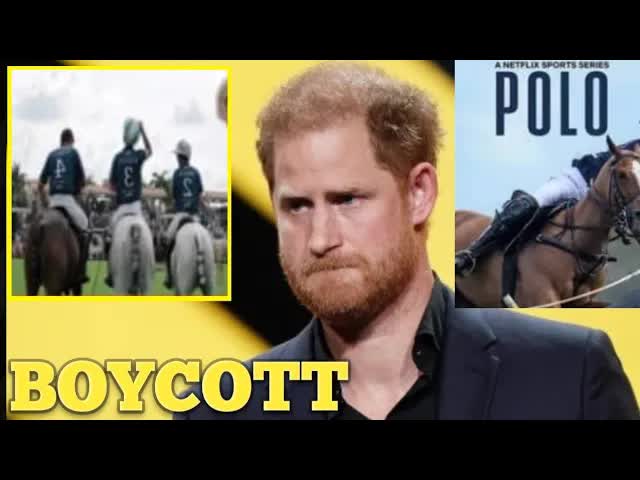The News
Prince Harry Faces Backlash Over Polo Series Amid Animal Cruelty Allegations
In recent weeks, a storm has brewed around Prince Harry and his participation in a polo series, ignited by animal rights organization PETA.
The uproar stems from serious allegations of animal cruelty linked to the sport, particularly concerning how horses are treated.
As awareness of animal welfare issues grows, the involvement of high-profile figures like Prince Harry inevitably draws intense scrutiny and debate.
Polo, often dubbed the sport of kings, boasts a long history intertwined with elite circles and royal families.
It features riders on horseback skillfully hitting a ball with mallets, showcasing both athletic prowess and the training of the horses.
Yet, while the game is visually captivating, it raises pressing questions about the welfare of the equine athletes involved.
PETA, which stands for People for the Ethical Treatment of Animals, has been a relentless advocate for humane treatment across various industries, including entertainment and food.
Their mission is clear: to shine a light on animal abuse and foster a world where animals aren't exploited for human enjoyment.
The recent call for a boycott of Prince Harry's polo series has sparked fierce discussions across social media and news outlets alike.
In a statement, PETA outlined their stance, asserting that polo can inflict significant physical and psychological stress on horses.
They argue that the rigorous demands of the sport—intense training and a highly competitive atmosphere—can lead to injuries and chronic health problems.
PETA has even pointed to specific incidents where horses have suffered severe injuries or, tragically, died during matches, rallying animal rights activists and concerned citizens to support their cause.
As the campaign against Prince Harry's involvement gained traction, social media became a battleground for opposing views.
Supporters of PETA flooded platforms with educational content, personal anecdotes, and distressing images aimed at raising awareness about the treatment of polo horses.
The hashtag #BoycottPrinceHarry began trending, capturing the attention of mainstream media and celebrities, some of whom expressed outrage at what they perceive as an endorsement of animal cruelty.
However, not everyone is on board with the backlash.
Defenders of Prince Harry argue that he has consistently championed various charitable causes, including mental health and environmental issues.
This duality highlights the tension between celebrity culture and social responsibility; public figures like Prince Harry are often held to higher standards, and their choices can ignite broader conversations about ethics and accountability.
The ongoing debate also reflects a larger shift in societal attitudes toward animal welfare in sports and entertainment.
Organizations like PETA have campaigned against numerous forms of animal exploitation, from circuses to dog racing.
As more individuals become aware of the ethical implications of their entertainment choices, traditional practices are increasingly scrutinized, prompting sports like polo to reconsider their approach to animal care.
As pressure mounts, Prince Harry and the polo series organizers face a critical juncture.
They may need to address the concerns raised by PETA and their supporters head-on, which could involve implementing stricter welfare standards for the horses, enhancing transparency regarding their treatment, and fostering open dialogue with animal rights advocates.
Ignoring these issues could jeopardize public support, potentially damaging both the polo series and Prince Harry's reputation.
PETA's allegations focus heavily on the physical and psychological toll that polo can impose on horses.
They argue that the sport's demands can lead to a slew of health problems, including injuries, stress, and even death.
Their campaign for a boycott is bolstered by both anecdotal evidence and documented cases of suffering within the sport.
One major point of contention is the risk of injury during matches.
PETA highlights the fast-paced nature of polo, which can result in collisions and falls that lead to serious harm.
They cite instances where horses have faced fractures and other debilitating injuries, even leading to euthanasia in some tragic cases.
This raises a critical question: does the thrill of polo justify the risks posed to these animals?
Beyond injuries sustained during play, PETA also criticizes the training methods used in polo.
They contend that the intense regimens can push horses beyond their limits, resulting in exhaustion and burnout.
Claims of excessive whipping and harsh training tools further fuel their argument that any sport requiring such treatment is inherently abusive.
Veterinary professionals and animal welfare experts have lent their voices to this discussion, echoing PETA's concerns about the impact of high-intensity sports on equine health.
Their studies highlight the need for reform, suggesting that the welfare of horses is often compromised in the pursuit of competition.
PETA emphasizes that these expert opinions should be taken seriously as they advocate for change within the sport.
Moreover, PETA has raised alarms about the living conditions of polo horses when they're not competing.
They assert that many horses endure inadequate housing, which can worsen existing health issues.
Additionally, breeding practices aimed at enhancing performance often prioritize physical traits over the overall well-being of the horses, further complicating the ethical landscape.
In response, supporters within the polo community argue that many players prioritize the welfare of their horses.
They claim that responsible polo practitioners adhere to strict veterinary guidelines and implement comprehensive training programs focused on equine health.
Despite these counterarguments, PETA's claims have gained considerable traction, especially as society becomes increasingly aware of animal rights issues.
PETA is effectively using social media to amplify their message, sharing graphic images and testimonials that illustrate the potential dangers faced by polo horses.
This strategy resonates with a growing audience concerned about animal welfare across all forms of entertainment and sport, making it clear that the conversation surrounding animal ethics in polo—and beyond—is far from over.




































































